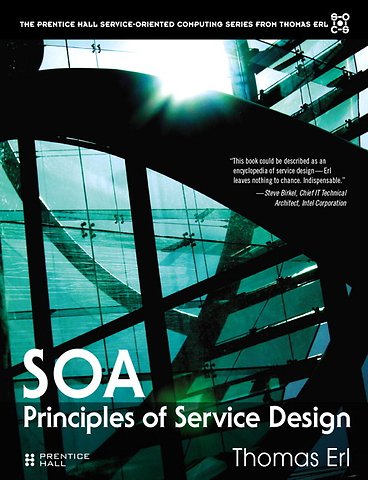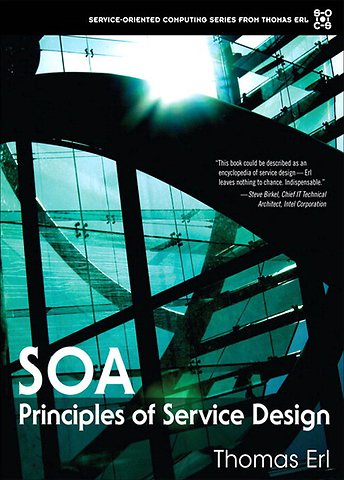


Thomas Erl is a top-selling IT author, founder of Arcitura Education Inc., and series editor of the Prentice Hall Service Technology Series from Thomas Erl.
Meer over Thomas ErlSOA Principles of Service Design
Paperback Engels 2016 2e druk 9780134695518Samenvatting
The Definitive Guide to Service Engineering
The key to succeeding with service-oriented architecture (SOA) is in comprehending the meaning and significance of its most fundamental building block: the service. It is through an understanding of service design that truly “service-oriented” solution logic can be created in support of achieving the strategic goals associated with SOA and service-oriented computing. Bestselling SOA author Thomas Erl guides you through a comprehensive, insightful, and visually rich exploration of the service-orientation design paradigm, revealing exactly how services should and should not be designed for real-world SOA.
This book’s in-depth coverage includes
- Over 240 full-color illustrations.
- A concise introduction to SOA and service-oriented computing concepts and benefits.
- A thorough exploration of the service-orientation design paradigm as represented by eight specific design principles.
- A comparison of service-oriented and object-oriented concepts and principles and a clear definition of what qualifies as “service-oriented” logic.
- Detailed coverage of four different forms of service-related design granularity.
- An exhaustive examination of service contracts, with an emphasis on standardization, abstraction, and the utilization of WS-Policy, XML Schema, and WSDL definitions.
- A comprehensive study of positive and negative service-related coupling types with an emphasis on the requirements to attaining a suitable level of loose coupling.
- An inside look into how commercial design approaches are incorporated to achieve truly agnostic and reusable service logic.
- Techniques for maximizing service reliability, scalability, and performance by instilling high levels of autonomy and emphasizing stateless design.
- Approaches for positioning services as highly discoverable and interpretable enterprise resources.
- Unprecedented coverage of how to design services for participation in complex compositions.
- The definition of concrete links between each design principle and the strategic goals and benefits of SOA and service-oriented computing.
- Numerous cross-references to key design patterns documented separately in SOA: Design Patterns.
Specificaties
Lezersrecensies
Inhoudsopgave
Chapter 1: Introduction 1
Chapter 2: Case Study Background 19
Part I: Fundamentals
Chapter 3: Service-Oriented Computing and SOA 25
Chapter 4: Service-Orientation 67
Chapter 5: Understanding Design Principles 103
Part II: Design Principles
Chapter 6: Service Contracts (Standardization and Design) 125
Chapter 7: Service Coupling (Intra-Service and Consumer Dependencies) 163
Chapter 8: Service Abstraction (Information Hiding and Meta Abstraction Types) 211
Chapter 9: Service Reusability (Commercial and Agnostic Design) 253
Chapter 10: Service Autonomy (Processing Boundaries and Control) 293
Chapter 11: Service Statelessness (State Management Deferral and Stateless Design) 325
Chapter 12: Service Discoverability (Interpretability and Communication) 361
Chapter 13: Service Composability (Composition Member Design and Complex Compositions) 387
Part III: Supplemental
Chapter 14: Service-Orientation and Object-Orientation: A Comparison of Principles and Concepts 445
Chapter 15: Supporting Practices 477
Chapter 16: Mapping Service-Orientation Principles to Strategic Goals 497
Appendices
Appendix A: Case Study Conclusion 513
Appendix B: Process Descriptions 517
Appendix C: Principles and Patterns Cross-Reference 529
Additional Resources 533
About the Author 535
About the Photos 537
Index 539
Anderen die dit boek kochten, kochten ook
Rubrieken
- advisering
- algemeen management
- coaching en trainen
- communicatie en media
- economie
- financieel management
- inkoop en logistiek
- internet en social media
- it-management / ict
- juridisch
- leiderschap
- marketing
- mens en maatschappij
- non-profit
- ondernemen
- organisatiekunde
- personal finance
- personeelsmanagement
- persoonlijke effectiviteit
- projectmanagement
- psychologie
- reclame en verkoop
- strategisch management
- verandermanagement
- werk en loopbaan





